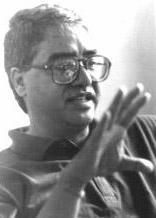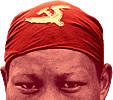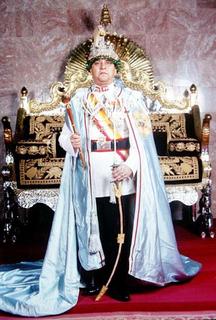
(I emailed this to oped@nytimes.com for consideration with this message: Please consider publishing this. I think this could be a NYT contribution to peace in Nepal. This viewpoint deserves to be read by the power brokers in DC, and the opinion makers elsewhere.)
Engaging, Not Demonizing The Nepali Maoists Will Bring Peace
Nepal is the number one hot spot on the planet right now: it is not Kashmir, Palestine or Ireland. I could not have seen this coming in 1996 when I left the country for the US for college. The worst case scenario projected into the future is a Nepal that is akin to Pol Pot’s Cambodia that seriously destabilizes a region, South Asia, home to a fifth of humanity. Iraq could end up looking like a picnic.
So who are these Nepali Maoists? What do they want? What are their capabilities? Can there be a safe landing to the insurgency? Can the worst case scenario be avoided? Could these Maoists morph themselves into a major peaceful force for progress?
Do I see the worst case scenario unfolding? Yes, as much as I see the United States sending a “manned” mission to Mars. It could happen, but it is not going to happen, not any time soon. Maoism is an open book ideology. And a communist republic is a stated goal of the Maoists, but then so is a manned mission to Mars for the US government. Some groups like to describe their goals in utopian terms.
The western media and governments make the cardinal mistake of basing their knowledge and understanding of the Nepali Maoists on what literature is available on the Cambodian and the Peruvian Maoists, even Mao and Stalin. That prevents them from seeing the Nepali Maoists for who they really are, more a product of Nepal's specific social conditions than the bookish Maoist ideology. Yes, they are violent, but then the French revolution for liberty, the American war of independence from British imperialism, and the American civil war to end slavery were all violent, not that the Maoist violence in Nepal has clear and total parallel to those events, and not that I personally see violence as a legitimate political weapon.
What do the Nepali Maoists want? They want an all-party interim government that will hold elections to a Constituent Assembly to draft a democratic constitution for a country that never really had democracy. It is for that idea in the case of Iraq that the US has spent upwards of 200 billion dollars and thousands of American lives. If Iraq had its “Maoists,” the US would not have had to part ways with all that money, all those lives.
But will the Maoists disarm before elections to such an Assembly is held? I don’t know. But that is the pre-condition the other two forces in Nepal, the democrats and the Monarchists, have to lay down. After elections are held, and multi-party democracy is introduced, what will the Maoists do to attain their goal of a communist republic? Their chief ideologue Dr. Baburam Bhattarai has repeatedly said that it is their “scientific, objective” analysis of Nepal’s socio-economic conditions that what Nepal needs right now is a democratic republic. The country will have to go through a few decades of “bourgeoise” democracy before it becomes “ripe” for a communist republic. And even then the attempt will be a peaceful transformation of the state. So, yes, the Maoists do intend to go to Mars, but it might not happen in your lifetime or mine, or that of any Maoist leader at the helm today.
Instead Nepal has a king with a dismal record. Before he ascended to the throne, the Maoists had infested a few isolated districts, and the insurgency had cost maybe 2,000 lives. After he took over and started experimenting, the insurgency has spread to more than 70 of Nepal’s 75 districts, and has cost an additional 10,000 lives.
And you have democrats, the parliamentary parties that danced to the tune of the limited democracy in the 1990s, who seem to be singularly incapable of a sustained, democratic dialogue among themselves and within their parties, leaders who admit the solution to the civil war is political and not military, and yet refuse to engage the Maoists in a respectful dialogue.
A Constituent Assembly is the only legitimate meeting point for the three forces on Nepal’s political landscape, the only lasting solution to the civil war. The force that is most reluctant to accept that reality is the force most responsible for the ongoing conflict, and that force is the Monarchists. Polls show such an Assembly will retain the monarchy, though in a strictly constitutional, ceremonial fashion, as it ought to be: anything else is undemocratic. Nepal is no Musharraf territory. But instead Nepal has a king who is bent on being “active,” and “constructive,” a king who likes to meddle, the country can go to hell.
Only such an Assembly will address the grievances of the DaMaJaMa coalition of the oppressed: Dalit, Madhesi, Janajati, Mahila, namely the low-caste, the people in the southern plains, the Sherpa, Tamang, Magar, Gurung, Rai and Limbu of the hills, and the women. Such a liberation has been something the Monarchists have been against, and the political parties of the 1990s have only paid lip service to.
But instead of pressuring the king towards such an Assembly and telling the Maoists they can have it but only if they agree to disarm beforehand, the western media and powers have been spending most of their energies demonizing the Nepali Maoists. Sure there are extremists among Maoists who could justify such demonizations, but then how fair would it be to judge the Republican and the Democratic parties in the US based on the viewpoints of their in-house extreme right and the extreme left elements? The two most influential Maoists are both for a Constituent Assembly, and that is what they have to be taken for.
Nepal should move towards a Constituent Assembly that will turn the country into a vibrant multi-party democracy with a constitutional monarchy. That is the only road to peace. The best case scenario is such a development could herald a major era of social progress and economic growth in the region.
(Paramendra Bhagat, a New Yorker, is engaged in the peace process in Nepal primarily through his blog http://demrepubnepal.blogspot.com)







